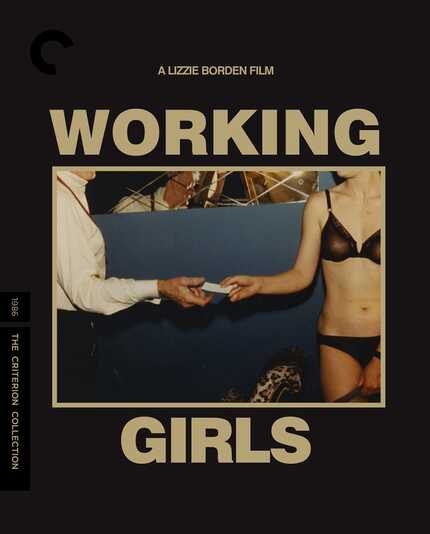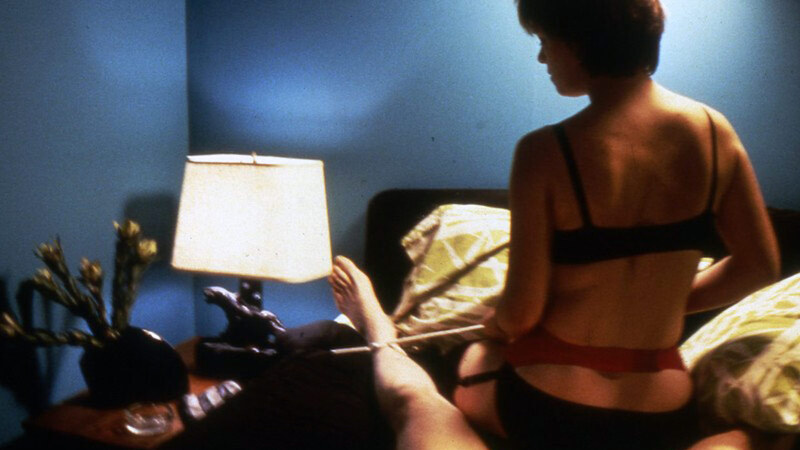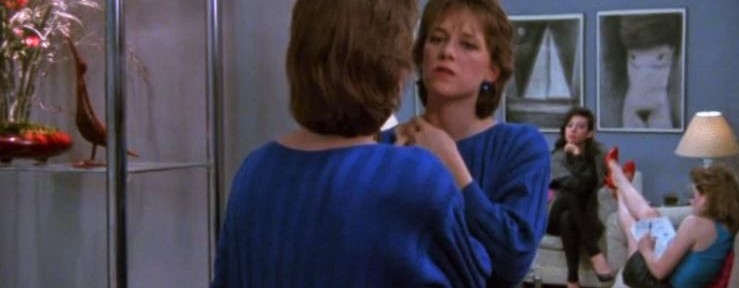Blu-ray Review: Criterion's WORKING GIRLS, A Day in the Sex Worker Life

Portrayals of sex workers in film tend to fall into extremes: either the high class escort/call girl who makes in the thousands (or more) a night, or the street prostitute or stripper working in a seedy club, usually surrounded by the dregs of society, and herself a victim of violence and drugs, or worse. That continues today, and so even a nearly 40-year-old film can still seem radical. Lizzie Borden's Working Girls is indeed still radical, and still revelant, in its presentation and examination of the life of an ordinary person, who happens to be a sex worker.
The film has been remastered and released as part of The Criterion Collection, and deservedly so; the film is one that both speaks to its time - that age of 'greed is good' New York City, and the flip side of the work taken on by those who were not part of that boom - and remains a pretty realistic portrayal of what could be called middle-class sex workers.
A day-in-the-life story, Working Girls follows Molly (Louise Smith), a photographer; she's has been a sex worker for two months, hiding her job from her live-in girlfriend and daughter. She works a daytime shift at a brothel, situated in a fairly run-of-the-mill New York apartment. She works alongside Gina Marusia Zach), who aspires to own a boutique, and Dawn (Amanda Goodwin), a student. When they're not entertaining clients, they talk about their lives and their jobs as sex workers, in the most mundance way that emphasizes that indeed, this is work, it's not the only thing in their lives.
But they also speak about the deeper issues of sex work; how their 'madame' Lucy (Ellen McElduff) takes more of their money than she should (and so they adjust the books to keep more for themselves); that while they're lucky to be in a relatively safe environment, not all their clients are safe. These daytime clients are mainly businessmen, and certainly they want to attend to the business of the brothel. Some engage in friendly conversation before getting down to thst business; some want their ego quite obviously stroked; and some will border on possession, thinking because they rent time with these women, they are entitled to more.
Borden spends nearly all of the film in this small space: the living room, kitchenette, and the bedrooms, and this intimacy forces us to spend real time with these women. These are people who aren't friends, of course, they are coworkers, just like any office space; and yet, the nature of their job begs a closeness and a desire for and need of protection. The rawness of their performances reflects the naturalism of their working world. But as the day progresses, it wears on Molly; through her, we can see how selling one's body in a more intimate situation than most other jobs (since many if not most jobs do entail selling or renting out bodies), might be too emotionally draining.
These are all distinct women: Molly is kind and direct; Gina acknowledges how sex work can hurt a personal life; Dawn is brazen and bold; and just because they have a woman as their 'pimp', doesn't mean they are much bettter off (Lucy is not-so-subtlely two-faced, pretending kindness when she still wants her 'girls' to work no matter their mental and emotional health). These actors are a joy to watch and each brings such depth to their roles, forcing us to look at sex workers as they really are: ordinary people. The 'johns', as noted, range from kind and professional to nearly outright violent, but too many of them make it clear that they think of these women as 'whores'.
By showing this more middle-class, everyday experience of the sex worker (and their clients), Borden's film is firmly within the realm of social realism, and asks us to reconsider work in the sex trade: how we portray it, how we interact with it, and how our society demonize the workers.
SPECIAL FEATURES
As usual, the quality of the restoration is fantastic; the 4K digital transfer (surpervised by Borden) retains the 1980s look without sacrificing quality. The commentary with Borden, Goodwin, and Director of Photography Jury Irola provide great anecdotes and insights to the production process - how they all managed in the small space, and how they evoked the themes of the story, often reflective of the filmmaking process itself as a combition of art, science, and commerce.
The booklet contains exceperts from an interview with Borden, conducted by Scott MacDonald, that was originally published in 1989; this is great as an archive piece to know how Borden was thinking and feeling about the film at that time, and how relevant her insights still are. But probably the best place to start with the extras, is the essay by film critic and writer So Mayer. Mayer gives a wonderful overview of the themes and context of the film, the language of the film, its place in Borden's filmography and her place among the queer filmmakers of the 1980s.
There are three terrific conversations, each adding a different dimension to the film. First, a chat between Borden, and Bette Gordon; like Borden, Gordon was making films like Variety, which explored women's connections to and interest in sex work, and these pioneers discuss the atmosphere of filmmaking for women in the 1980s, and what they hope their films achieved and how they resonate today. Producer Andi Gladstone, actors Smith and Goodwin, and Assistant Director Vicky Funari converse about what the film meant to them, how they each got involved, and how it expanded their careers and their work in their artistic fields. Probably the most interesting and enlightening, though, of these conversations is between four women who today work in the sex industry: Antonia Crane, Daphne, Selena the Stripper, and Jo Wheldon. Not only do we get to hear these women talk about their views on the film and how it portrays sex work (spoiler alert: they all thought it was very well done), but they talk about how sex work has changed, both for the better and not so better.
I hate to use the phrase 'important film' (it's too often made to seem like a teacher scolding their students), but yes, Working Girls is not only a great film, an insightful and intimate look at sex workers, but an important one, in American, feminist, and queer cinema, and the Criterion edition is well worth it.
Working Girls
Director(s)
- Lizzie Borden
Writer(s)
- Lizzie Borden
- Sandra Kay
Cast
- Louise Smith
- Ellen McElduff
- Amanda Goodwin









